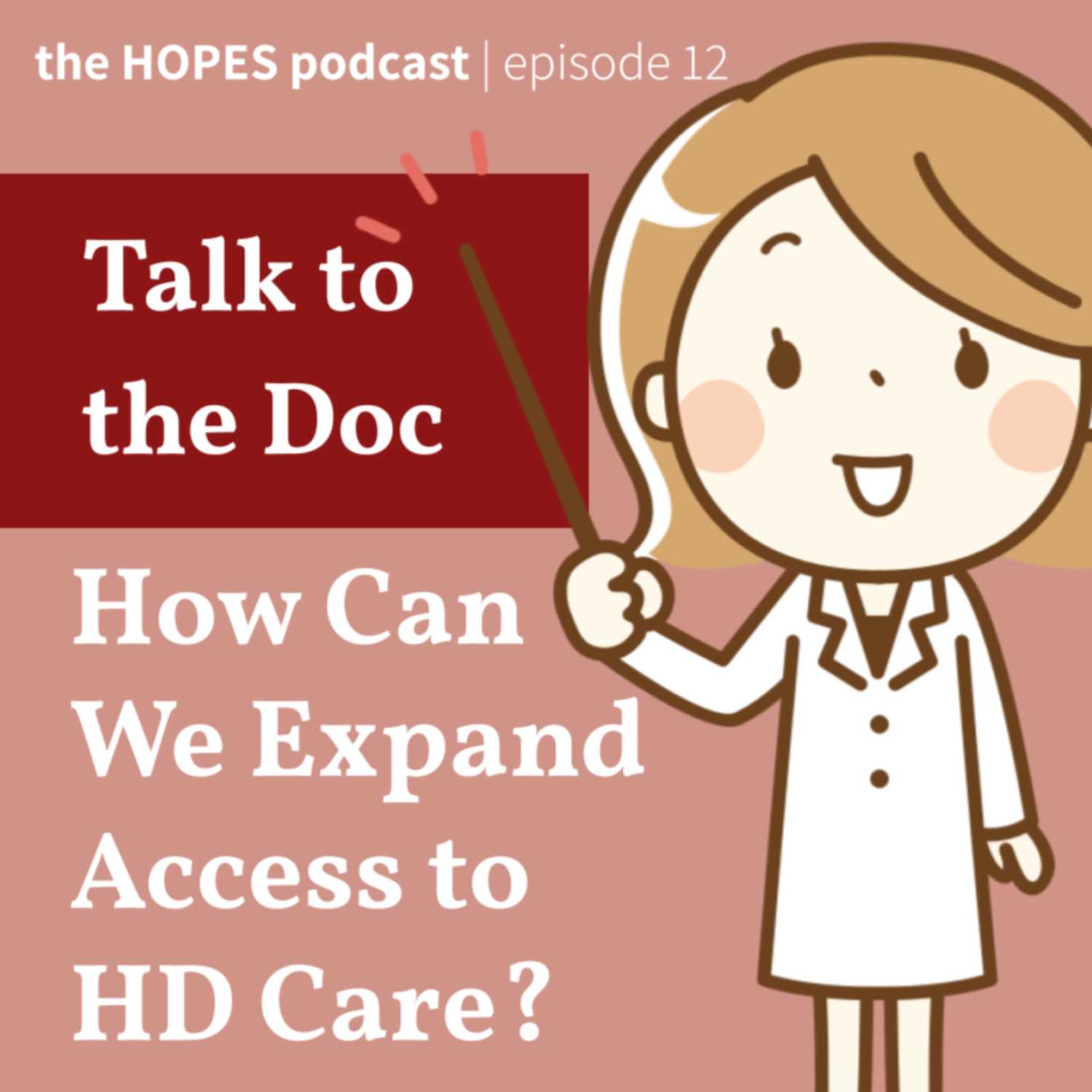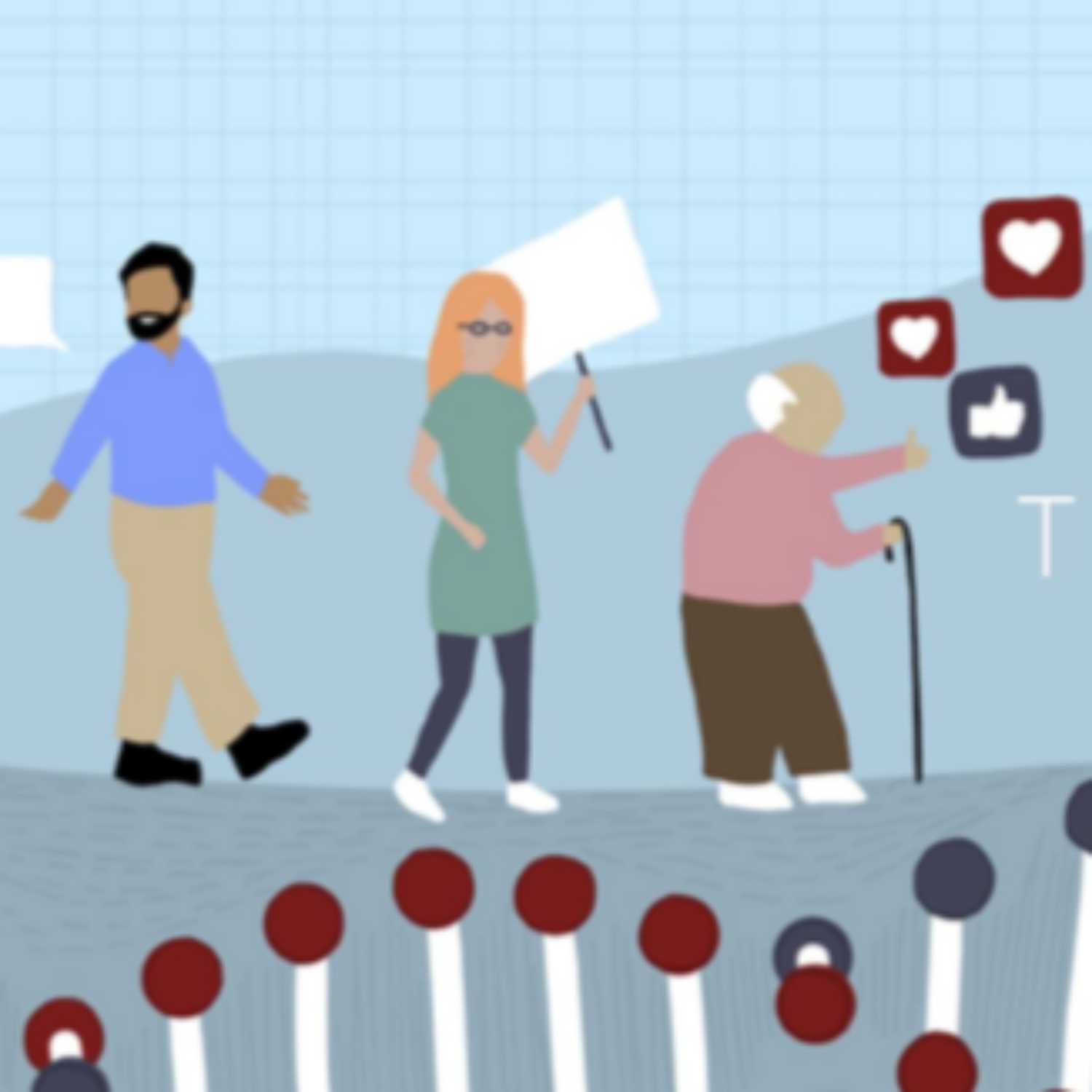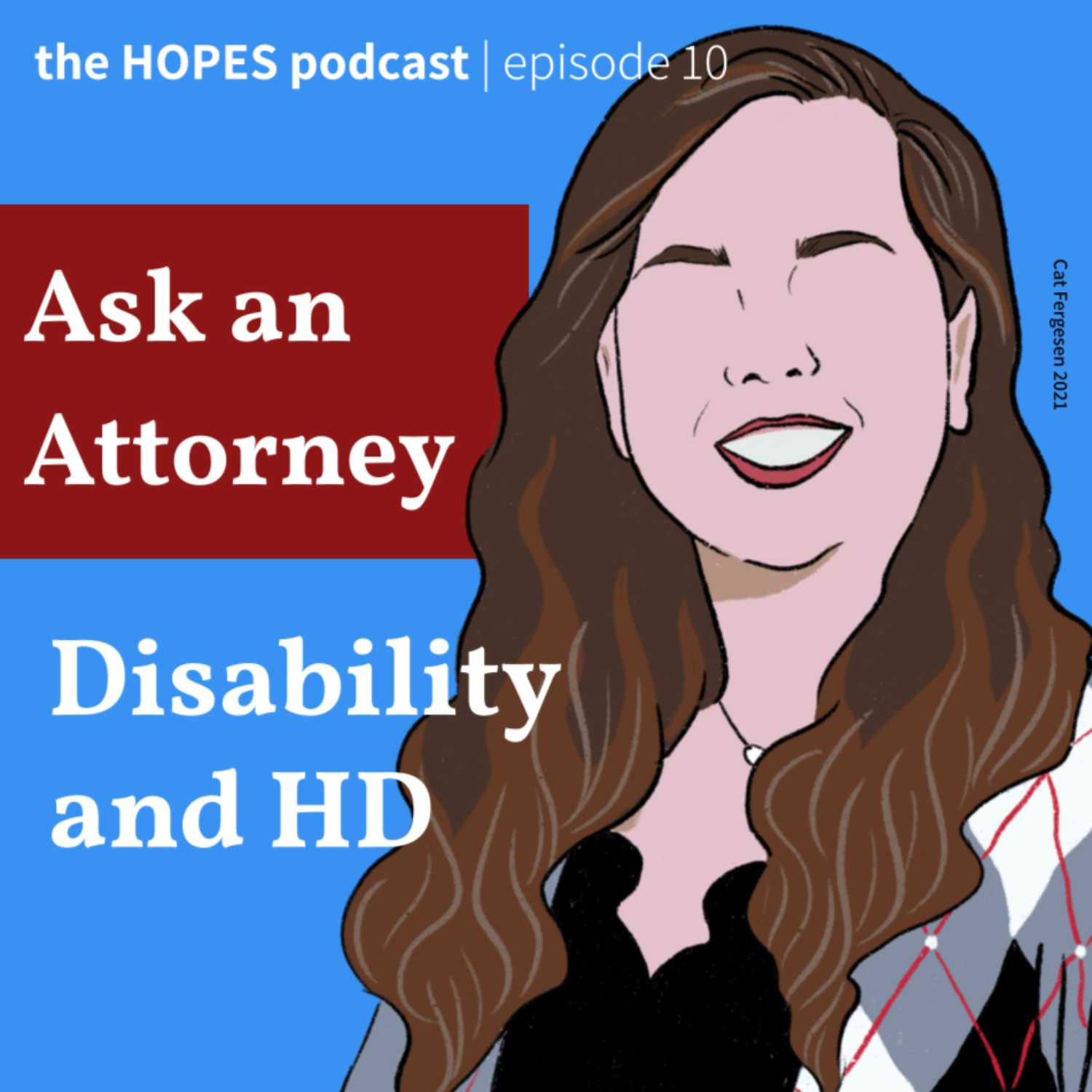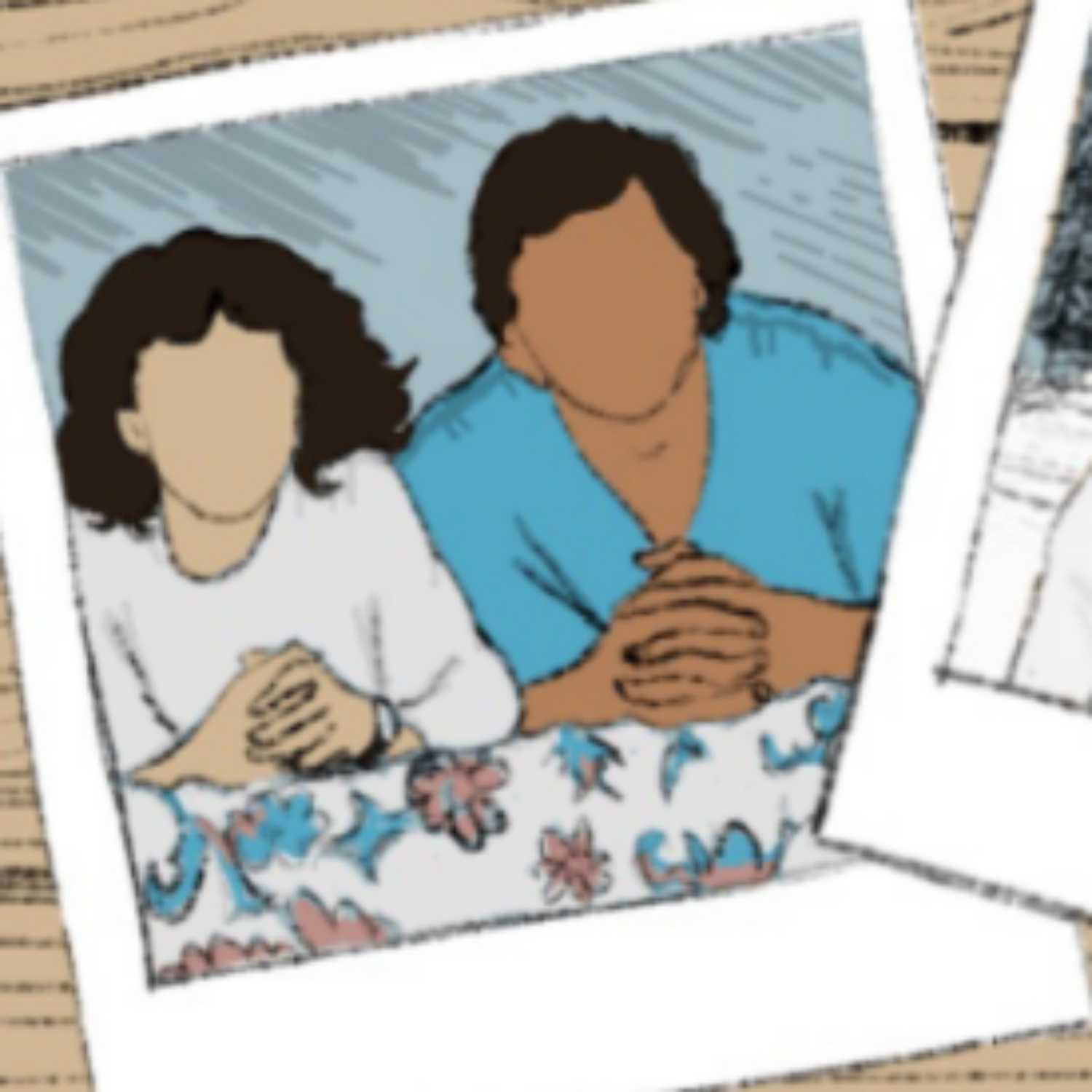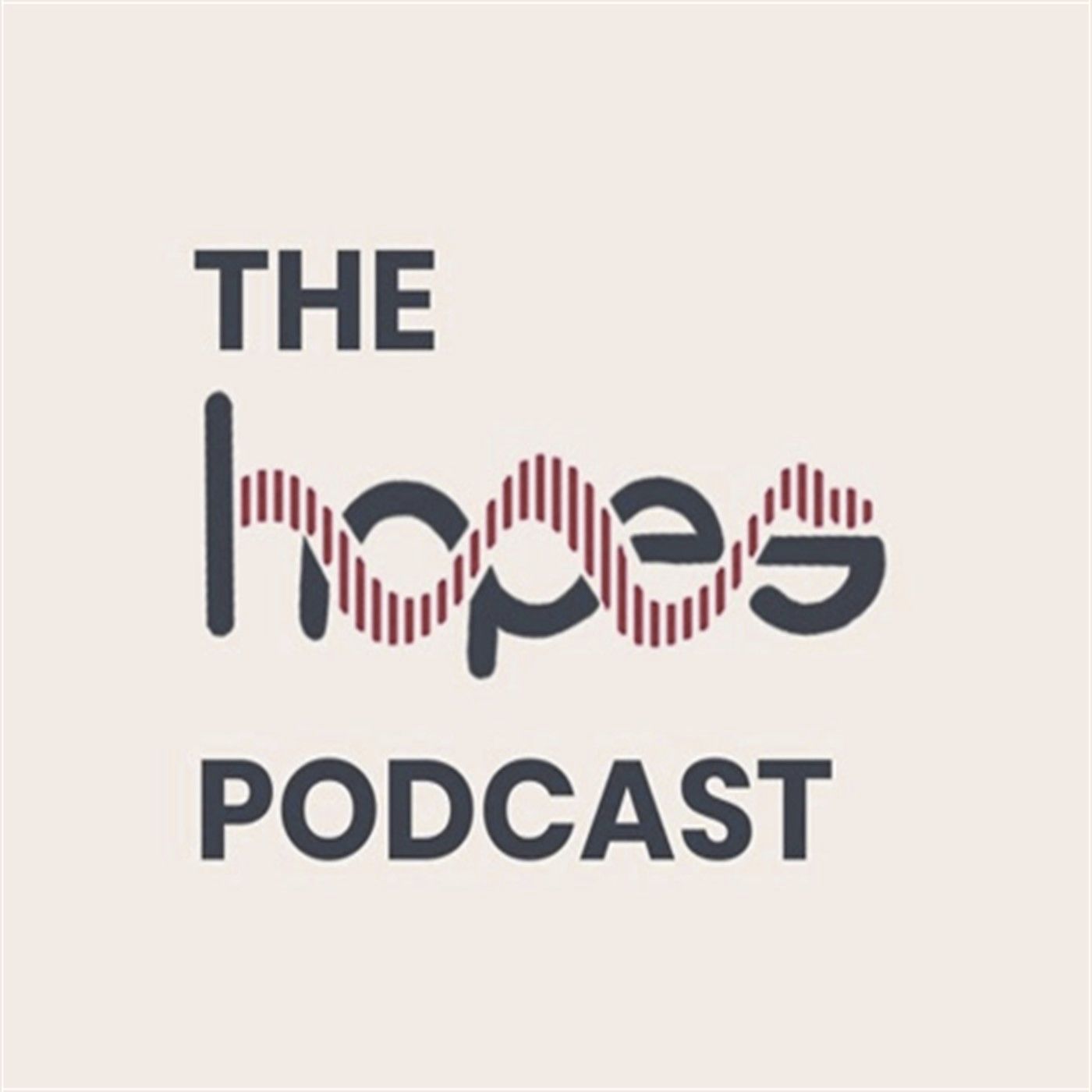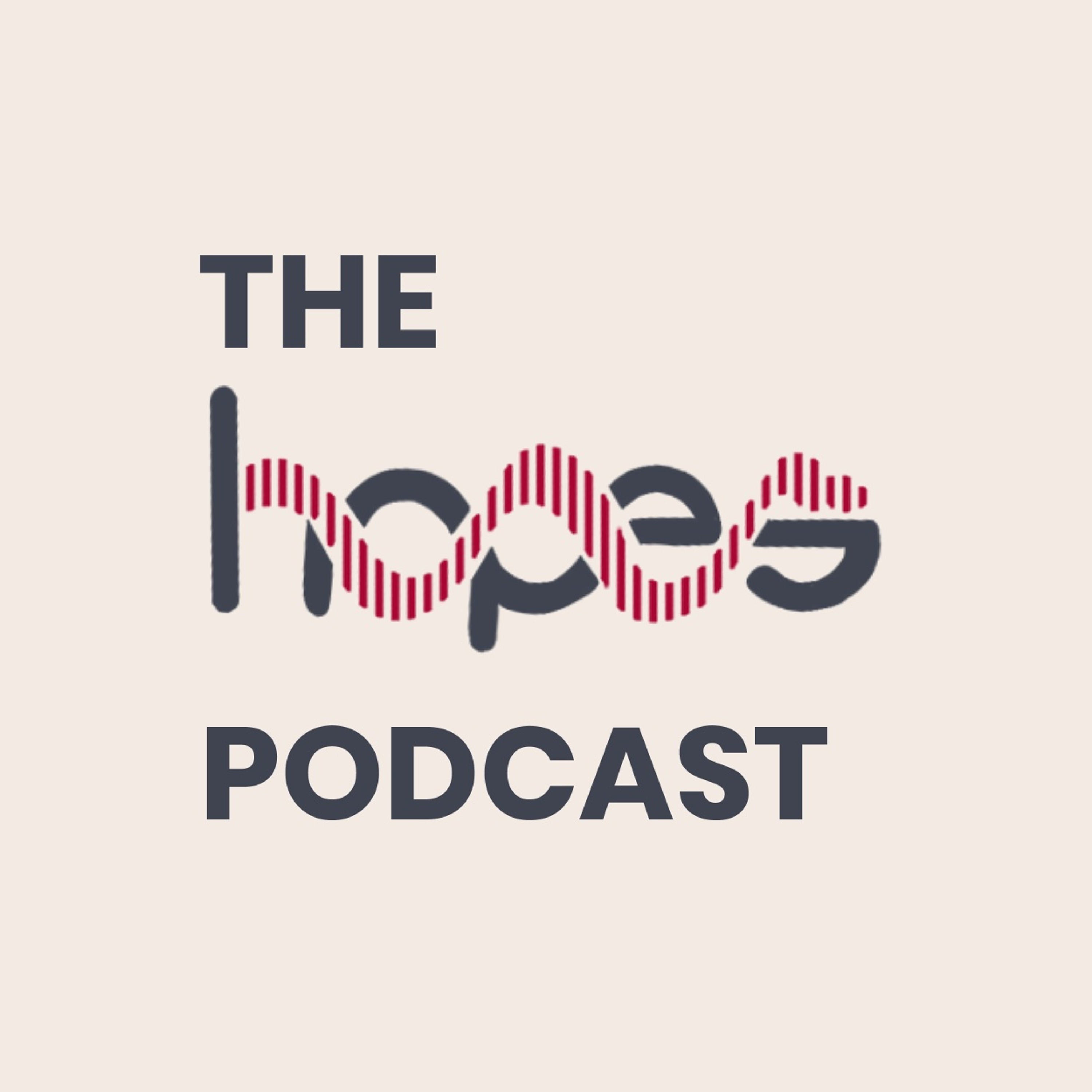Discover The HOPES Podcast from Stanford
The HOPES Podcast from Stanford

The HOPES Podcast from Stanford
Author: hopespodcast
Subscribed: 7Played: 52Subscribe
Share
© All rights reserved
Description
Brought to you by the Huntington’s Outreach Project for Education at Stanford, the HOPES podcast shares stories that shed light on the history and current issues in Huntington’s Disease research.
12 Episodes
Reverse
As an individual with Huntington's Disease, a family member, or a caregiver, have you ever struggled to access the medical care that you need? Huntington's Disease (HD) is a rare neurological disease that has a worldwide prevalence of 5-10 cases per 100,000 individuals. Those affected may sometimes experience long wait times or must travel thousands of miles to reach medical specialists with the ability to provide care for Huntington's. In this episode of the HOPES podcast, our newest podcaster, Avanti Ramraj, speaks with UC Davis neurologist and professor Dr. Alexandra Duffy about why access to Huntington's Disease care is so limited and the potential for expanding care to reach all those in need.This podcast was produced by Avanti Ramraj with help from Cat Fergesen. The graphic includes public domain artwork by oksmith.Songs in this podcast: Coming soon.
What is HD advocacy? How can people get involved, and how do people who don’t have HD in their families, but still want to help, fit in? On this episode of the HOPES podcast, we speak to Max Moon, who is the volunteer director of advocacy at the Huntington’s Disease Society of America (HDSA), and Cole Holderman, who is a former co-leader of HOPES, a current HDSA board member, and an aspiring doctor. Neither have HD in their families, but were drawn to HD advocacy nonetheless, and continue to be involved in different ways. Listen in for their insights into advocacy, their service philosophies, and their advice on getting involved. Content warning: This podcast discusses the loss of loved ones. This podcast was produced by Cat Fergesen. The graphic is by Kenneth Ronquillo.Songs in this podcast:“Sandu” by Hugo ‘Droopy’ Contini, CC BY-NC-SA 3.0 https://freemusicarchive.org/music/Hugo_Droopy_Contini/Surpriscording/droopy_contini_-_03_-_sandu https://creativecommons.org/licenses/by-nc-sa/3.0/
Dealing with HD means having to jump through a lot of legal hoops to get the support that you need. Today on the HOPES Podcast, we feature special guest Allison Bartlett, Esq., a licensed disability attorney who currently serves as the manager of disability programs at the Huntington’s Disease Society for America (HDSA). Allison walks us through disability, both private and public, long-term care insurance, health insurance, and how someone with HD and their loved ones might approach the process of accessing those benefits. It’s very complex, and she’s the expert! Listen in to hear what she wants to share with the HD community about this topic.This podcast was produced by Lauren Hinkley and Cat Fergesen. The graphic is by Cat Fergesen.Disclaimer: HOPES is a team of faculty and undergraduate students at Stanford University dedicated to making information about Huntington’s disease (HD) more readily accessible to the public. We emphasize that we are not medical professionals or legal professionals, nor are we affiliated with the legal professional whom we interview on this podcast. The information we present is intended for educational purposes only should not be construed as offering diagnoses or recommendations. The legal professional whom we interview is providing ideas about disability insurance that listeners may consider according to their own judgment but should not consider advice specific to their situation.Songs: “Planet Zero” by Jahzzar, CC BY-SA 3.0 https://freemusicarchive.org/music/Jahzzar/1Up/Planet_Zero https://creativecommons.org/licenses/by-sa/3.0/“Dark Matter” by Podington Bear, CC BY-NC 3.0 https://freemusicarchive.org/music/Podington_Bear/Thoughtful/DarkMatter https://creativecommons.org/licenses/by-nc/3.0/
In this episode of the HOPES podcast, we meet Dawn, who took care of her partner of 35 years, Tom, throughout his life with HD. For caregivers, looking after a loved one with HD means facing the unfortunate realities of the disease, and looking for moments of connection in the worst of times. For some, it also means grieving your loved one before they pass. Listen in to hear Dawn and Tom’s story and how they weathered the end-of-life stage of HD that can be so difficult.Content warning: This podcast discusses death and grief. There is also discussion of some everyday bodily functions, medical care, and hospital settings. Note: in the podcast, Dawn uses the term “BM” to refer to a bowel movement.This podcast was produced by Cat Gonzales Fergesen. The illustration is by Kenneth Ronquillo based on photos contributed by Dawn.Songs in this podcast: “The Devil is a Sad Spirit” by James Beaudreau, CC BY-NC-SA 3.0“DJ” by Jahzzar, CC BY-SA 4.0“Space (Outro)” by Andy Cohen, CC BY 4.0“Interlude 9” by Ending Satellites, CC BY-NC-SA 3.0“We’re from near and far” by Ending Satellites, CC BY-NC-SA 3.0“A Day in Port-Royal” by Ending Satellites, CC BY-NC-SA 3.0“Vladimir Estragon’ by Jahzzar, CC BY-SA 3.0“No-End Ave” by Jahzzar, CC BY-SA 4.0“Country Young” by Pheasant, CC BY-NC-SA 4.0
In this episode of the HOPES podcast, we’re talking about the brain on drugs. The recent movements to legalize cannabis and psychedelics in the United States and other countries around the world is based in part on promising research into the potential health benefits of the drugs when used in controlled settings. Listen in to hear from a psychedelics user who is gene positive for HD, a researcher from the University of Saskatchewan on cannabinoids for HD, two researchers from the Johns Hopkins Center for Psychedelic and Consciousness Research, and a psychedelic-assisted psychotherapist and research consultant about research on these Schedule 1 drugs and their therapeutic potential.
Find Dr. Manoj Doss on Twitter @ManojDoss
Find Dr. Kile Ortigo’s upcoming book, Beyond the Narrow Life: A Guide to Psychedelic Integration and Existential Exploration at https://books.google.com/books/about/Beyond_the_Narrow_Life_A_Guide_to_Psyche.html?id=L6GfzQEACAAJ
Content warning: Psychedelics (psilocybin, LSD, MDMA), cocaine, cannabis. The majority of psychedelics are not legal in the United States. This podcast seeks only to provide information on an experimental field and does not recommend that any person seek out psychedelics as therapy for any condition.
This podcast was produced by Cat Fergesen. The graphic is by Cat Fergesen.
Music:
“Partnership for a Drug-Free America 1990 PSA Collection”, Public Domain Mark 1.0
https://archive.org/details/pdfapsas
https://creativecommons.org/publicdomain/mark/1.0/
“Early One Morning (Assassinator Dub)” by Hayvanlar Alemi, CC BY-NC-SA 3.0
https://freemusicarchive.org/music/Hayvanlar_Alemi/Visions_of_a_Psychedelic_Ankara/05_Early_One_Morning_Assassinator_Dub
https://creativecommons.org/licenses/by-nc-sa/3.0/
“Disco High” by UltraCat, CC BY 3.0
https://freemusicarchive.org/music/UltraCat/Disco_High/ultracat_-_01_-_disco_high
https://creativecommons.org/licenses/by/3.0/
“Against the Grain (Phish Funk Remix)” by Psychadelik Pedestrian, CC BY-NC 3.0
https://freemusicarchive.org/music/Psychadelik_Pedestrian/Best_Bytes_Volume_3/12_-_Psychadelik_Pedestrian_-_Against_The_Grain_Phish_Funk_remix
https://creativecommons.org/licenses/by-nc/3.0/
“Dark Matter” by Podington Bear, CC BY-NC 3.0
https://freemusicarchive.org/music/Podington_Bear/Thoughtful/DarkMatter
https://creativecommons.org/licenses/by-nc/3.0/
“Genova 2013 Birds chirping” by Gopalkoduri, CC BY 3.0
https://freesound.org/people/gopalkoduri/sounds/195097/
https://creativecommons.org/licenses/by/3.0/
“Your body in the dark” by Menion, CC BY-NC-SA 2.5 IT
https://freemusicarchive.org/music/Menion/Out_of_soundOut_of_silence/06_LBN002_06_-_Menion_-_Your_body_in_the_darkmp3
https://creativecommons.org/licenses/by-nc-sa/2.5/it/
“Cannabis Cafe” by David Rovics, CC BY-NC-SA 3.0 US
https://freemusicarchive.org/music/David_Rovics/We_Just_Want_The_World/05_-_David_Rovics_-_Cannabis_Cafe
https://creativecommons.org/licenses/by-nc-sa/3.0/us/
Having a family isn’t an easy task, but it’s a dream that many young couples hope for. When a genetic neurodegenerative disease is part of the picture, though, what does having a family look like? Today in the HOPES Podcast, we meet with a couple who found out their HD status completely by chance - and in a pretty unusual way. HD changed not only their lives, but the lives of the generations of their family to come.
HD-specific topics: in-vitro fertilization (IVF), preimplantation genetic diagnosis (PGD), expansion events, post-mortem donation for research
Names have been changed to protect privacy. CW: Blood, labor, medical procedures, termination of pregnancy, needles, dissection (in a medical and scientific context).
Podcast produced by Cat Gonzales Fergesen.
Graphic by Kenneth Ronquillo.
To learn more about HOPES or Huntington’s Disease, visit hopes.stanford.edu/
Music:
"Funky Banane - Nightclub (CB 005)" or "Funky Banane Nightclub (ID 210)"
Checkie Brown - www.checkie-brown.de
www.musikbrause.de (CC-by-nc-nd)
Left for Deadish by junior85, CC BY-NC-SA 3.0
https://creativecommons.org/licenses/by-nc-sa/3.0/
Noose Mitten by Mac68K, CC BY-NC-SA
https://creativecommons.org/licenses/by-nc-sa/3.0/
Tè verde by Macchiato Funky, CC BY-NC-SA 4.0
https://creativecommons.org/licenses/by-nc-sa/4.0/
December Mourning by Montana Skies, CC BY-NC-SA 3.0 US
https://creativecommons.org/licenses/by-nc-sa/3.0/us/
Baby Birch Heartbeat by Daniel Birch, CC BY-NC 4.0
https://creativecommons.org/licenses/by-nc/4.0/
Spirit Family by Grandfather Gold, CC BY-NC-SA 3.0 US
https://creativecommons.org/licenses/by-nc-sa/3.0/us/
As rare as Huntington’s Disease is, even rarer is Juvenile Huntington’s Disease (JHD). What is JHD? How is it different from HD? What is it like to have JHD? Learn about JHD and hear from a caretaker of a JHD patient on this month’s HOPES Podcast!
The music heard in today’s episode was found on freemusicarchive.
Podcast produced by Sammy Potter and Cat Fergesen.
Graphic by Kenneth Ronquillo
For more information on the Huntington’s Disease Society of America, visit www.hdsa.org.
To learn more about HOPES or Huntington’s Disease, visit hopes.stanford.edu/.
Per Jody’s request, to learn about The Shepherd's Gift, an organization raising awareness for HD, visit http://www.theshepherdsgift.org/.
Or, learn more about JHD at these links:
https://hdsa.org/what-is-hd/history-and-genetics-of-huntingtons-disease/juvenile-onset-hd/
https://en.hdbuzz.net/264
https://www.futuremedicine.com/doi/abs/10.2217/nmt.13.18
https://hdsa.org/find-help/community-social-support/social-workers/
https://www.ncbi.nlm.nih.gov/pmc/articles/PMC3022767/
If you had the power to know if you would develop a neurodegenerative disease, would you want to know? How could that choice be impacted by the dynamics of family, finances, and mental health? We talk to a young woman whose family has been impacted by Huntington's Disease and how she and her siblings have dealt with the dilemma of whether or not to get tested.
This episode of the HOPES Podcast is dedicated to Lizzie's father, Arturo (1957-2020.
To learn more about HOPES or Huntington’s Disease, visit hopes.stanford.edu/
Podcast produced by Cat Fergesen
Graphic by Kenneth Ronquillo
Music:
Voicemails courtesy of Lizzie
Drift Mastered by Scott Holmes, CC BY-NC 4.0
https://creativecommons.org/licenses/by-nc/4.0/
Childhood Memories by Scott Holmes, CC BY-NC 4.0
https://creativecommons.org/licenses/by-nc/4.0/
Sadness Cosmo by Bruno_ph, from https://freesound.org/s/109409/
Emotional Original Soundtrack by Magmi Soundtracks, from https://freesound.org/s/510752/
Dark Instrumental, Music by Andrey Psyche, from https://freesound.org/s/494905/
Always the Last to Know by Scott Holmes, CC BY 4.0
https://creativecommons.org/licenses/by/4.0/
Symphony No. 1: I. Hope? by Steve Combs, CC BY 4.0
https://creativecommons.org/licenses/by/4.0/
Symphony No. 1: IV. Hope by Steve Combs, CC BY 4.0
https://creativecommons.org/licenses/by/4.0/
A Vital Piece of Music For All Your Soundtrack Needs by Steve Combs, CC BY 4.0
https://creativecommons.org/licenses/by/4.0/
The HOPES podcast is back! In episode 4, we spoke with Anna Canoni, Woody & Marjorie Guthrie’s granddaughter, about how Woody’s battle against HD spiraled into the international HD community we have today. From this point forward, we plan on putting out a new episode every month.
For more information on Woody Guthrie Publications, visit www.woodyguthrie.org
To learn more about HOPES or Huntington’s Disease, visit hopes.stanford.edu/
The music heard in today’s episode was found on freemusicarchives.
Podcast produced by Sammy Potter and Cat Fergesen
Graphic design by Renad Abualjamal
In our third episode, the HOPES podcast talks to Dr. Lisa Stanek, Senior Principal Scientist at Sanofi, about her Huntington’s Disease research. Dr. Stanek’s paper discussed in this episode can be found at: https://www.ncbi.nlm.nih.gov/pubmed/24484067.
The music heard in today’s episode was found on freemusicarchives and includes the following:
“Carousel” by Johnny Ripper
“I’m not here” by Johnny Ripper
“(Untitled) waking up” by Johnny Ripper
“On the moon” by Johnny Ripper
“Error, inc” by Johnny Ripper
In our second episode, the HOPES podcast follows Nancy Wexler's hunt to discover the Huntingtin gene.
We used music from freesound.org and freemusic archives. Today you heard:
"Slow Sad Tones" by TJ Mothy
"Treasure Hunt (Instrumental)" by Simon Panrucker
We share stories of caretakers, doctors, people with Huntington’s Disease, and others in the Huntington’s community. This podcast is run by HOPES, the Huntington’s Outreach Project for Education, at Stanford.
In the first episode, historian Alice Wexler guides us through the history of Huntington's Disease.
Music is from freesound.org and Free Music Archives. The music featured in this episode includes:
"Slow Sad tones" by TJ Mothy
"Solitary Beach" by baidocin
"I’m not here" by Johny Ripper


